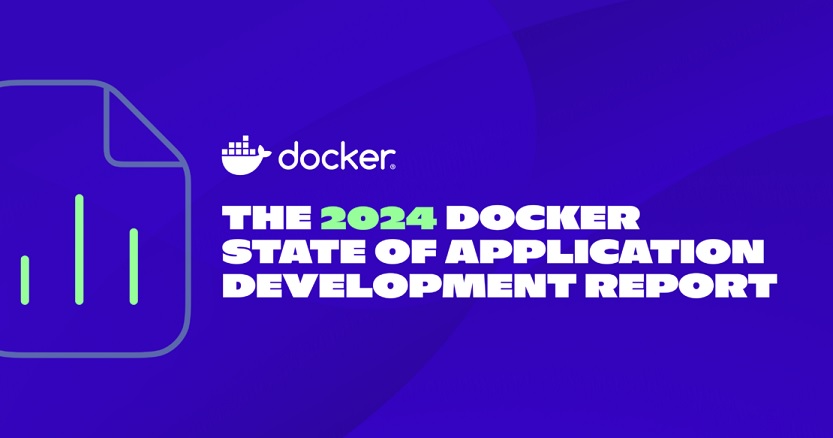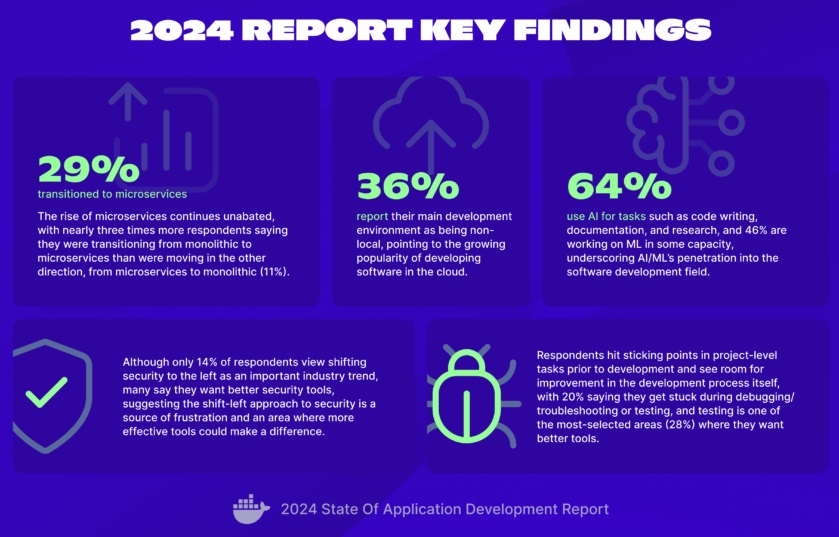webAI and MacStadium(link is external) announced a strategic partnership that will revolutionize the deployment of large-scale artificial intelligence models using Apple's cutting-edge silicon technology.
The state of application development in 2024 shows further trends toward cloud development, open source, microservices and AI/ML integration according to the 2024 State of Application Development Report from Docker.

Source: Docker(link is external)
Key findings of the report include:
Growing reliance on cloud during development
When asked about their main development environments, responses illustrated the increasing shift toward cloud-based environments. While 64% of respondents still primarily develop locally on their laptops or desktops, there is a notable trend toward remote environments.
Challenges and opportunities
The report identified key areas where development teams encounter obstacles in the development process, such as planning (31%), estimation (24%), and designing (22%). Additionally, 28% of respondents indicated a need for better planning tools, while 20% reported getting stuck during debugging/troubleshooting and testing phases.
Microservices and security
Microservices adoption continues to trend upwards, with nearly three times more respondents transitioning from monolithic architectures to microservices than the reverse. However, the shift-left approach to security remains a challenge, with 34% of responses rating security tasks difficult and 25% seeking better tools for security/vulnerability remediation.
Open source contributions
The report underscores the importance of open source software in the developer community, with 59% of respondents contributing to open source projects in the past year. Among those who did not contribute, 72% expressed interest in doing so in the future.
AI/ML Integration
As previously reported in Docker's AI Trends Report 2024: AI's Growing Role in Software Development, the integration of AI/ML in development processes is becoming mainstream, with 64% of respondents using AI tools for tasks like writing code, documentation, and research. Junior and mid-level developers, as well as DevOps/Platform Engineers, show higher dependency on AI compared to their senior counterparts.

Source: Docker(link is external)
Methodology: Over 1,300 developers were surveyed in the report, conducted in the fall of 2023. The online survey collected data on the tools used by developers, their application development processes, challenges, opinions on industry trends, Docker usage, and engagement in developer communities. Out of the 1,300 participants, 885 successfully completed the survey.
Industry News
Development work on the Linux kernel — the core software that underpins the open source Linux operating system — has a new infrastructure partner in Akamai. The company's cloud computing service and content delivery network (CDN) will support kernel.org, the main distribution system for Linux kernel source code and the primary coordination vehicle for its global developer network.
Komodor announced a new approach to full-cycle drift management for Kubernetes, with new capabilities to automate the detection, investigation, and remediation of configuration drift—the gradual divergence of Kubernetes clusters from their intended state—helping organizations enforce consistency across large-scale, multi-cluster environments.
Red Hat announced the latest updates to Red Hat AI, its portfolio of products and services designed to help accelerate the development and deployment of AI solutions across the hybrid cloud.
CloudCasa by Catalogic announced the availability of the latest version of its CloudCasa software.
BrowserStack announced the launch of Private Devices, expanding its enterprise portfolio to address the specialized testing needs of organizations with stringent security requirements.
Chainguard announced Chainguard Libraries, a catalog of guarded language libraries for Java built securely from source on SLSA L2 infrastructure.
Cloudelligent attained Amazon Web Services (AWS) DevOps Competency status.
Platform9 formally launched the Platform9 Partner Program.
Cosmonic announced the launch of Cosmonic Control, a control plane for managing distributed applications across any cloud, any Kubernetes, any edge, or on premise and self-hosted deployment.
Oracle announced the general availability of Oracle Exadata Database Service on Exascale Infrastructure on Oracle Database@Azure(link sends e-mail).
Perforce Software announced its acquisition of Snowtrack.
Mirantis and Gcore announced an agreement to facilitate the deployment of artificial intelligence (AI) workloads.
Amplitude announced the rollout of Session Replay Everywhere.
Oracle announced the availability of Java 24, the latest version of the programming language and development platform. Java 24 (Oracle JDK 24) delivers thousands of improvements to help developers maximize productivity and drive innovation. In addition, enhancements to the platform's performance, stability, and security help organizations accelerate their business growth ...













